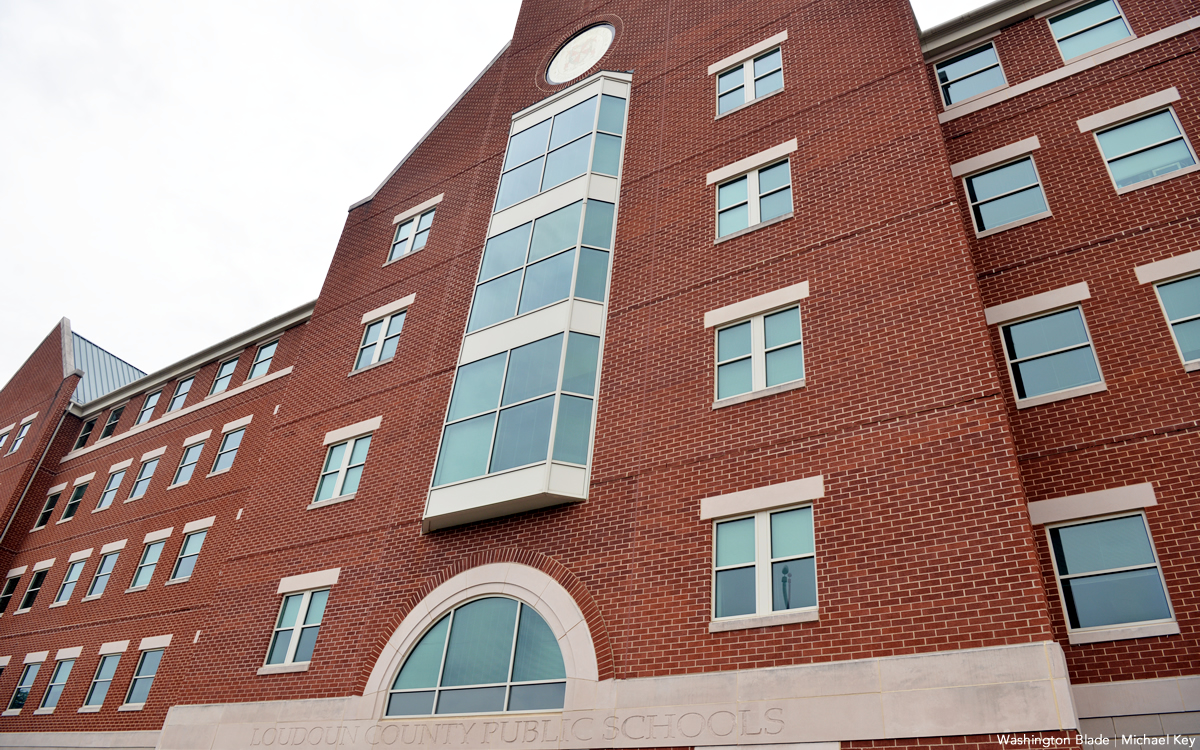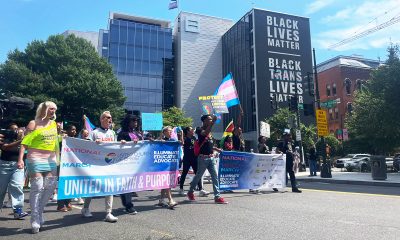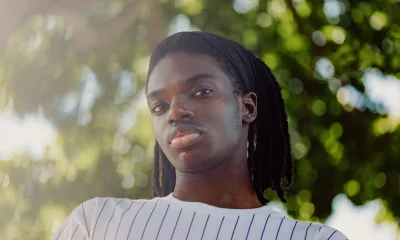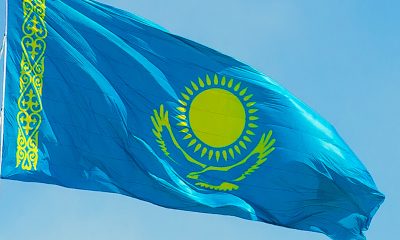Local
D.C. election board rejects marriage referendum
For the third time in less than a year, the D.C. Board of Elections & Ethics has ruled that a ballot measure seeking to ban same-sex marriage cannot be held because it would violate the city’s Human Rights Act.
The board’s ruling Thursday came eight days after opponents and supporters of a gay marriage referendum presented their views on the issue before an expedited public hearing called by the board.
“Based upon the written and oral opinions submitted to the board regarding the propriety of a referendum, as well as its own research and consideration of the matter, the board now concludes that the referendum does not present a proper subject for a referendum because it would authorize discrimination prohibited under the Human Rights Act,” says the ruling.
On two prior occasions, the board and Superior Court judges reached the same conclusion: that a referendum as well as a voter initiative seeking to ban same-sex marriage would violate the city’s human rights law and could not be held.
Similar to the two prior cases, Bishop Harry Jackson, pastor of a Beltsville, Md., church and the lead opponent of same-sex marriage in the District, along with several of his supporters, have vowed to appeal the board’s ruling to the Superior Court.
In an action that could disappoint LGBT activists, the board additionally ruled that the proposed referendum would not violate a separate D.C. election law restriction by interfering with the appropriation of funds or the city budget.
An attorney representing the Gertrude Stein Democratic Club joined the City Council’s attorney in arguing that a ban on same-sex marriage would result in a reduction of as much $1 million in tax revenue generated each year by same-sex weddings. The two attorneys cited a study conducted by the city’s chief financial officer showing that same-sex weddings would be expected to generate significant revenue for D.C. businesses as well as tax revenue for the city.
“[N]otwithstanding the arguments that the [same-sex marriage law] will result in increased revenue for the District, such prospective fiscal impact is insufficient to transform the [law] into an act appropriating funds for the general operation budget,” the board says in its ruling.
It says that various court cases cited by the two attorneys to support the budget argument do not apply in the case of the marriage referendum proposed by Jackson and his backers.
The board’s rejection of the budget argument against a referendum could result in problems for same-sex marriage equality advocates if an appeals court were to side with Jackson and reject the Human Rights Act restriction. Some LGBT activists had hoped the budget argument could be used as a backup plan in the event the human rights law argument runs into trouble at the appeals court level.
The referendum proposal rejected Thursday by the election board calls for overturning the Religious Freedom & Civil Marriage Equality Act of 2009, which the D.C. City Council passed and Mayor Adrian Fenty signed in December. The act would allow same-sex marriages to be performed in the District. It also would authorize churches and religious institutions to refuse to perform such marriages or allow their facilities to be used for such marriages if same-sex unions are contrary to their religious doctrine.
Under the city’s election law, various logistical requirements for a referendum, including the gathering of petition signatures for ballot placement, must be completed before Congress concludes its review of a city law. The congressional review for the marriage bill is expected to be completed March 2, making it unlikely that Jackson and his backers could gather the required petition signatures in time, even if the Superior Court were to rule in their favor.
Last year, Jackson asked the court to extend the deadline for gathering the pettion signature if the court would have ruled to allow a ballot measure to be held. The court rejected that request at the time it rule against the referendum itself.
“I am pleased that the Board of Elections & Ethics has again upheld the Human Rights Act and said that under that a ballot measure to restrict the rights of a minority is not appropriate or allowable under D.C. law,” said Peter Rosenstein, a D.C. gay activist.
Jackson and others calling for the referendum couldn’t immediately be reached for comment.
Virginia
DOJ seeks to join lawsuit against Loudoun County over trans student in locker room
Three male high school students suspended after complaining about classmate

The Justice Department has asked to join a federal lawsuit against Loudoun County Public Schools over the way it handled the case of three male high school students who complained about a transgender student in a boys’ locker room.
The Washington Blade earlier this year reported Loudoun County public schools suspended the three boys and launched a Title IX investigation into whether they sexually harassed the student after they said they felt uncomfortable with their classmate in the locker room at Stone Bridge High School in Ashburn.
The parents of two of the boys filed a lawsuit against Loudoun County public schools in U.S. District Court for the Eastern District of Virginia in Alexandria. The Richmond-based Founding Freedoms Law Center and America First Legal, which White House deputy chief of staff Stephen Miller co-founded, represent them.
The Justice Department in a Dec. 8 press release announced that “it filed legal action against the Loudoun County (Va.) School Board (Loudoun County) for its denial of equal protection based on religion.”
“The suit alleges that Loudoun County applied Policy 8040, which requires students and faculty to accept and promote gender ideology, to two Christian, male students in violation of the Equal Protection Clause of the 14th Amendment to the U.S. Constitution,” reads the press release.
Assistant Attorney General Harmeet K. Dhillon of the Justice Department’s Civil Rights Division in the press release said “students do not shed their First Amendment rights at the schoolhouse gate.”
“Loudoun County’s decision to advance and promote gender ideology tramples on the rights of religious students who cannot embrace ideas that deny biological reality,” said Dhillon.
Outgoing Virginia Gov. Glenn Youngkin and outgoing Virginia Attorney General Jason Miyares in May announced an investigation into the case.
The Virginia Department of Education in 2023 announced the new guidelines for trans and nonbinary students for which Youngkin asked. Equality Virginia and other advocacy groups claim they, among other things, forcibly out trans and nonbinary students.
The U.S. Department of Education’s Office of Civil Rights in February launched an investigation into whether Loudoun County and four other Northern Virginia school districts’ policies in support of trans and nonbinary students violate Title IX and President Donald Trump’s executive order that prohibits federally funded educational institutions from promoting “gender ideology.”
District of Columbia
Capital Pride announces change in date for 2026 D.C. Pride parade and festival
Events related to U.S. 250th anniversary and Trump birthday cited as reasons for change

The Capital Pride Alliance, the D.C. based group that organizes the city’s annual LGBTQ Pride events, has announced it is changing the dates for the 2026 Capital Pride Parade and Festival from the second weekend in June to the third weekend.
“For over a decade, Capital Pride has taken place during the second weekend in June, but in 2026, we are shifting our dates in response to the city’s capacity due to major events and preparations for the 250th anniversary of the United States,” according to a Dec. 9 statement released by Capital Pride Alliance.
The statement says the parade will take place on Saturday, June 20, 2026, with the festival and related concert taking place on June 21.
“This change ensures our community can gather safely and without unnecessary barriers,” the statement says. “By moving the celebration, we are protecting our space and preserving Pride as a powerful act of visibility, solidarity, and resistance,” it says.
Ryan Bos, the Capital Pride Alliance CEO and President, told the Washington Blade the change in dates came after the group conferred with D.C. government officials regarding plans for a number of events in the city on the second weekend in June. Among them, he noted, is a planned White House celebration of President Donald Trump’s 80th birthday and other events related to the U.S. 250th anniversary, which are expected to take place from early June through Independence Day on July 4.
The White House has announced plans for a large June 14, 2026 celebration on the White House south lawn of Trump’s 80th birthday that will include a large-scale Ultimate Fighting Championship (UFC) event involving boxing and wrestling competition.
Bos said the Capital Pride Parade will take place along the same route it has in the past number of years, starting at 14th and T Streets, N.W. and traveling along 14th Street to Pennsylvania Ave., where it will end. He said the festival set for the following day will also take place at its usual location on Pennsylvania Avenue, N.W., between 2nd Street near the U.S. Capitol, to around 7th Street, N.W.
“Our Pride events thrive because of the passion and support of the community,” Capital Pride Board Chair Anna Jinkerson said in the statement. “In 2026, your involvement is more important than ever,” she said.
District of Columbia
Three women elected leaders of Capital Pride Alliance board
Restructured body includes chair rather than president as top leader

The Capital Pride Alliance, the D.C.-based group that organizes the city’s annual LGBTQ Pride events, announced it has restructured its board of directors and elected for the first time three women to serve as leaders of the board’s Executive Committee.
“Congratulations to our newly elected Executive Officers, making history as Capital Pride Alliance’s first all-women Board leadership,” the group said in a statement.
“As we head into 2026 with a bold new leadership structure, we’re proud to welcome Anna Jinkerson as Board Chair, Kim Baker as Board Treasurer, and Taylor Lianne Chandler as Board Secretary,” the statement says.
In a separate statement released on Nov. 20, Capital Pride Alliance says the restructured Board now includes the top leadership posts of Chair, Treasurer, and Secretary, replacing the previous structure of President and Vice President as the top board leaders.
It says an additional update to the leadership structure includes a change in title for longtime Capital Pride official Ryan Bos from executive director to chief executive officer and president.
According to the statement, June Crenshaw, who served as acting deputy director during the time the group organized WorldPride 2025 in D.C., will now continue in that role as permanent deputy director.
The statement provides background information on the three newly elected women Board leaders.
• Anna Jinkerson (chair), who joined the Capital Pride Alliance board in 2022, previously served as the group’s vice president for operations and acting president. “A seasoned non-profit executive, she currently serves as Assistant to the President and CEO and Chief of Staff at Living Cities, a national member collaborative of leading philanthropic foundations and financial institutions committed to closing income and wealth gaps in the United States and building an economy that works for everyone.”
• Kim Baker (treasurer) is a “biracial Filipino American and queer leader,” a “retired, disabled U.S. Army veteran with more than 20 years of service and extensive experience in finance, security, and risk management.” She has served on the Capital Pride Board since 2018, “bringing a proven track record of steady, principled leadership and unwavering dedication to the LGBTQ+ community.”
• Taylor Lianne Chandler (Secretary) is a former sign language interpreter and crisis management consultant. She “takes office as the first intersex and trans-identifying member of the Executive Committee.” She joined the Capital Pride Board in 2019 and previously served as executive producer from 2016 to 2018.
Bos told the Washington Blade in a Dec. 2 interview that the Capital Pride board currently has 12 members, and is in the process of interviewing additional potential board members.
“In January we will be announcing in another likely press release the full board,” Bos said. “We are finishing the interview process of new board members this month,” he said. “And they will take office to join the board in January.”
Bos said the organization’s rules set a cap of 25 total board members, but the board, which elects its members, has not yet decided how many additional members it will select and a full 25-member board is not required.
The Nov. 20 Capital Pride statement says the new board executive members will succeed the organization’s previous leadership team, which included Ashley Smith, who served as president for eight years before he resigned earlier this year; Anthony Musa, who served for seven years as vice president of board engagement; Natalie Thompson, who served eight years on the executive committee; and Vince Micone, who served for eight years as vice president of operations.
“I am grateful for the leadership, dedication, and commitment shown by our former executive officers — Ashley, Natalie, Anthony, and Vince — who have been instrumental in CPA’s growth and the exceptional success of WorldPride 2025,” Bos said in the statement.
“I look forward to collaborating with Anna in her new role, as well as Kim and Taylor in theirs, as we take on the important work ahead, prepare for Capital Pride 2026, and expand our platform and voice through Pride365,” Bos said.




















